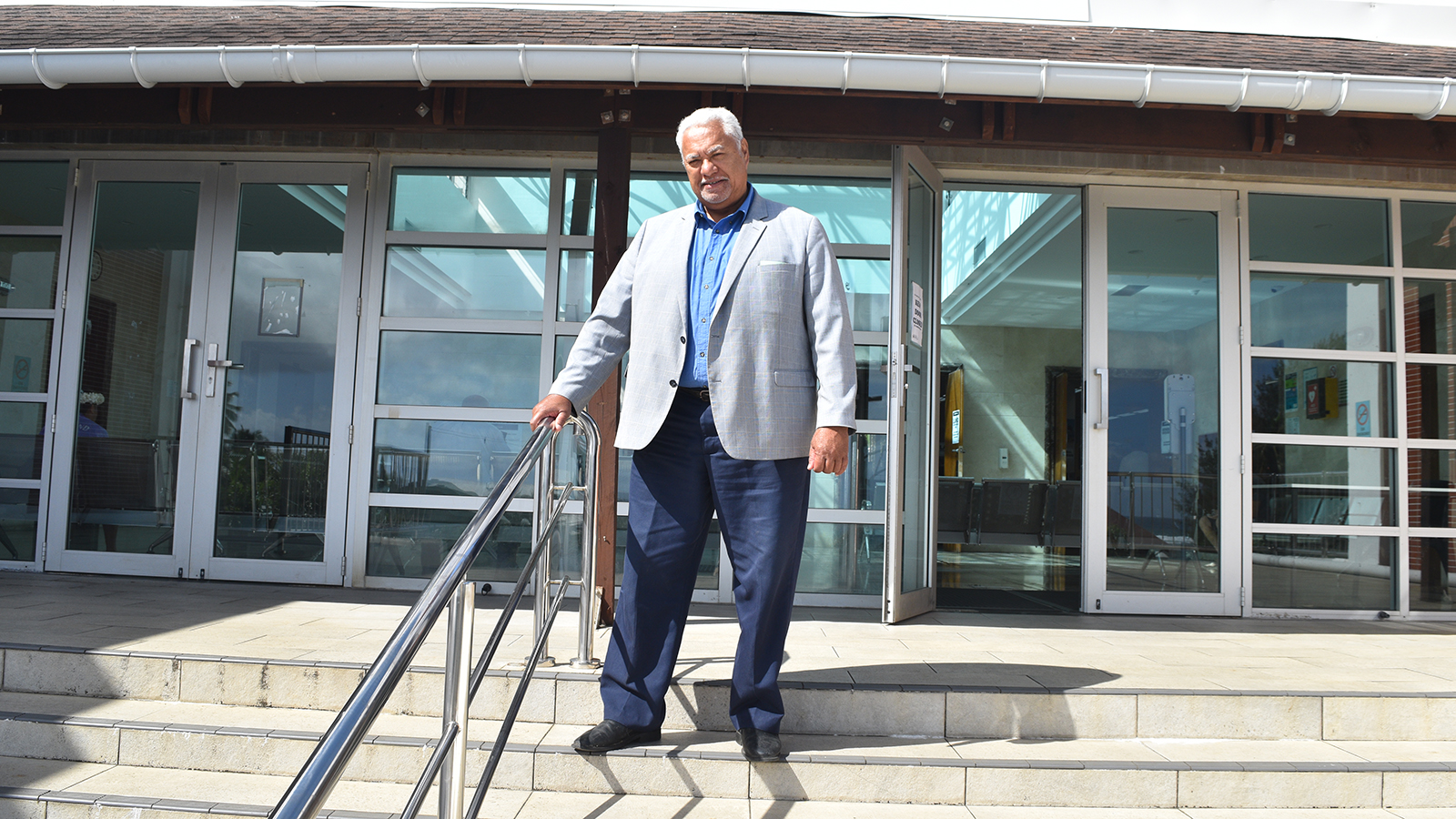Sonny Williams shares deep passion for language
Saturday 17 September 2022 | Written by Matthew Littlewood | Published in Features

Sonny Williams waits outside the Court in Avarua for a jury trial to begin. Photo: Matthew Littlewood/22091606
Sonny Williams is passionate about Cook Islands Māori, and wants others to immerse themselves in the language. He talks to Cook Islands News journalist Matthew Littlewood about his role as a translator and what he wants to see happen with the language.
Sonny Williams is a measured man. He takes his time over answers, and thinks deeply about each question.
The former secretary of culture for Cook Islands, and recently elected MP for Titikaveka, spends a lot of time thinking about how to improve the coverage of Cook Islands Māori. It’s often on his mind.
“When I was the secretary of culture in the early 2000s, they brought in the Te Reo Māori Act. It was designed not to replace English as the official language of our people, but to have it alongside it at the same level,” Williams says.
“The problem was previously it was only the English language version that was recognised as the official version, and for many, especially in a court or Parliament setting, they felt the English language didn’t quite capture the nuances.”
In 2019, Williams became a translator for Parliament.
“When I was head of the Ministry of Culture, I had a couple of workers who assisted with translating in Parliament. I started listening to them in Parliament, and I got interested in it. I felt it was something I could do,” he says.
Williams says he is concerned about the declining participation rate of Cook Islands Māori speakers.
“There’s been a marked drop. That’s why there’s been a big push in the Pacific to revive their native languages. You see it in New Zealand especially with Te Reo. I think that country has been one of the best in introducing schemes to change the trend,” Williams says.
He says the biggest drop in the use of Cook Islands Māori has been in Rarotonga, in the outer islands people still speak it regularly and fluently.
“It’s about encouraging parents to speak it with their children. I try to do so with my kids. I come from the last generation where speaking Cook Islands Māori was a punishable event at school. That was one of the relics of colonial administrations. I think it was done to encourage our people to speak English, but it went too far and suppressed us. I think you’re now seeing the pendulum starting to swing back the other way,” Williams says.
“It’s a generational thing. You can’t fix it quickly. It might get to the stage where ideas such as total Māori immersion schools, similar to what they have in New Zealand, become present.”
Williams says a knowledge of Cook Islands Māori is crucial to understanding the history and culture of the island nation.
“You understand the history, the mountains, the values. A lot of our history written in English loses some of the nuances that you have in spoken Māori. Once you understand the language, you understand customary practices, you can’t have total understanding of everything Māori in English,” he says.
Earlier this month, Williams acted as an interpreter for a jury trial. It was the first jury trial he had overseen in this role, and he admitted he was learning a lot on the spot.
“In Parliament, before you actually sit in the House, you have to figure out what they’re going to say. You get a Bill about two weeks before it goes through Parliament. There’s a lot of background work, you have a fair idea of what people are going to say. In Court, you don’t have that,” he says.
“In Court, there’s a lot of very specific technical language. I could understand the concepts, and it was trying to simplify those concepts. You’re translating for the benefit of the jury, and most jurors are not experts of the law. I noticed a lot of the jurors really started paying attention to me during the trial as soon as they lawyers stopped talking.”
“That’s what I’m pleased about. To be able to make people understand.”
Williams admits there were times during the jury trial where he had to ask the judge for an explanation of certain terms or words, but says it was necessary.
“If you don’t get a quarter or third of what they’re saying, you have a problem. And if you have a problem, then the jury has a real problem,” he says.
Williams says the key to any good translator is fluency with the languages, and a knowledge of the situational vocabulary.
“Most people are okay with written translation, it’s the spoken translation that’s the fear. Especially if you’re doing it live for radio or television or livestreamed all over the world. That’s a fearsome thing to deal with: speaking someone else’s thoughts in another language,” he says.
Unlike many, Williams says he doesn’t get nervous during translations. In fact, he was suited to it.
“It all came down to the long experience in government, being fluent in the language of it. I’m a public speaker anyway, so a lot of that natural fear and anxiety didn’t exist,” he says.
“For me, it gave me a challenge, it woke me up to everything. As long as you’re able to correct yourself, then you’ll manage. In Parliament, with the better speakers, they’ll correct you.”
Williams is awaiting the outcome of the petition process, but right now, he is the elected MP for Titikaveka.
He wonders whether he’ll have to drop his translation jobs should he become a MP. It’s something he would like to work around. “I’d like to be able to continue translating. I hope I can, because it’s important. Everyone needs to understand the language.”




















































